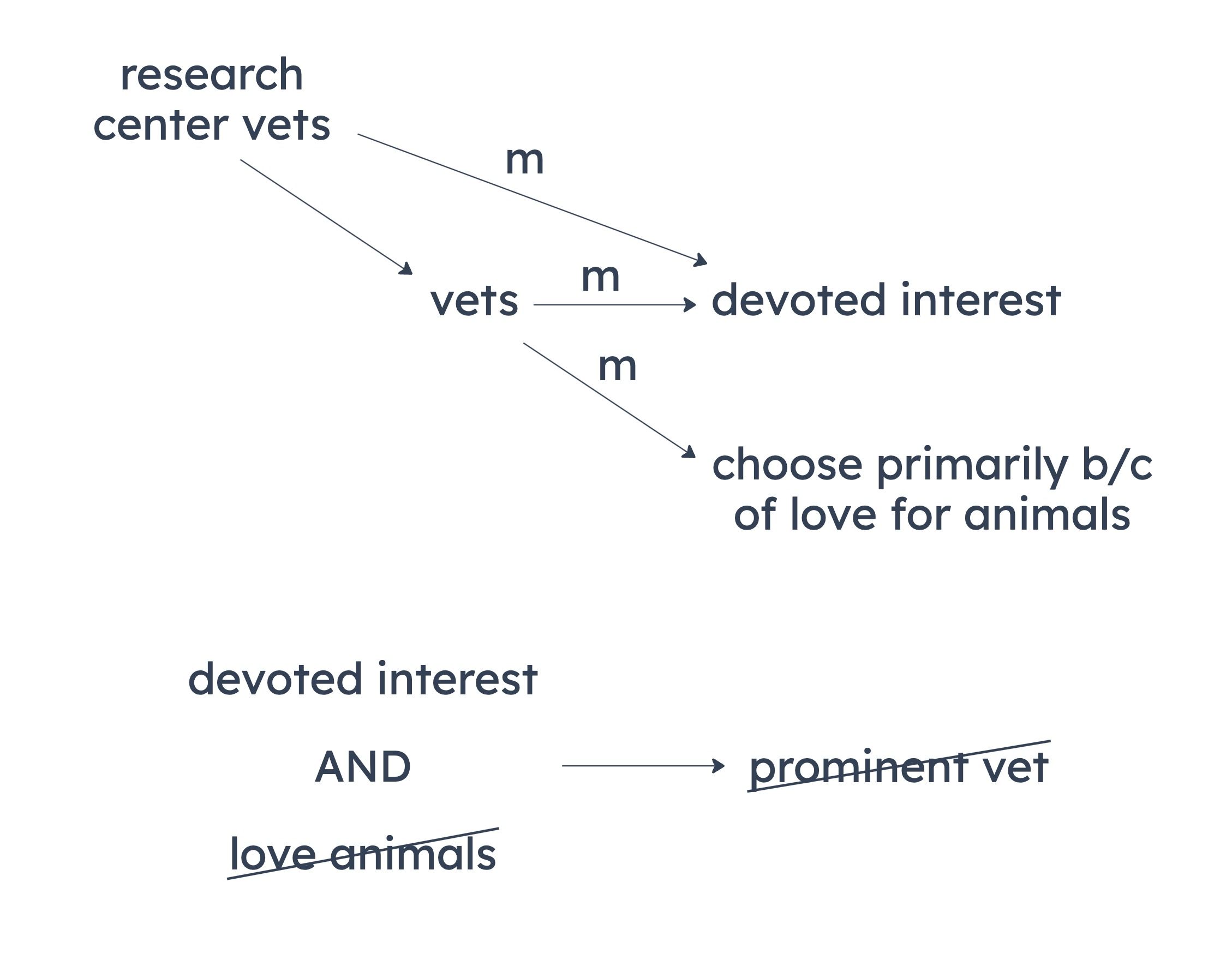A
The press is unusually inaccurate when it reports on people’s private lives.
B
Reporting on politicians’ private lives distracts voters from more important issues in a campaign.
C
Much writing on politicians’ private lives consists of rumors circulated by opposing candidates.
D
In recent elections, the best local politicians have refused to run for national office because of the intrusiveness of press coverage.
E
Politicians’ personality flaws often ultimately affect their performance on the job.

Some people with a devoted interest in biology chose their profession primarily because of love for animals.
A
Some veterinarians have a greater love for biological science than for individual animals.
B
Most veterinarians love animals and have an interest in biological science.
C
Prominent veterinarians at some veterinary research centers are intensely devoted to the biological sciences but do not feel any pronounced affection for animals.

D
Few veterinarians at university research centers chose their profession primarily because they love animals.
E
Most veterinarians who are not prominent regard an understanding of the biological sciences as the most important quality for success in their profession.
A
The chemicals used in treated lumber are apparently not dangerous to the consumer.
B
Treated lumber is as dangerous when used outdoors as it is when used indoors.
C
The effects on humans from the chemicals in treated lumber should be studied.
D
Parents should not allow children to put their mouths on playground equipment.
E
Treated lumber is more dangerous than was once believed.
A
Pollens are often transported from one region to another by wind or human movement.
B
There are several less complicated methods of determining the history of the movement of an object than the analysis and identification of pollen.
C
Many types of pollen were common to several geographical regions in the ancient world.
D
Data are scarce as to the geographical distribution of the pollens of many ancient plants.
E
Pollen analysis is a painstaking process that is also expensive to conduct.
Consumer activist: When antilock brakes were first introduced, it was claimed that they would significantly reduce the incidence of multiple-car collisions, thereby saving lives. Indeed, antilock brakes have reduced the incidence of multiple-car collisions. I maintain, however, that to save lives, automobile manufacturers ought to stop equipping cars with them.
"Surprising" Phenomenon
If antilock brakes have reduced the incidence of multiple-car collisions, why does the consumer activist maintain that, to save lives, automobile manufacturers ought to stop equipping cars with antilock brakes?
Objective
The correct answer must identify how manufacturing cars without antilock brakes could directly or indirectly save more lives than manufacturing cars with antilock brakes even though antilock brakes have reduced the occurrence of multiple-car collisions.
A
Drivers and passengers in automobiles with antilock brakes feel less vulnerable, and are thus less likely to wear seat belts.
If fewer people wear seat belts while driving with antilock brakes than without, the lack of seatbelt usage could cause more lost lives than the number of lives saved from the reduction in multiple-car collisions because of antilock brakes.
B
Under some circumstances, automobiles with traditional brakes stop just as quickly as do automobiles with antilock brakes.
The stimulus tells us that antilock brakes have led to a decrease in multiple-car collisions, so this is irrelevant.
C
For inexperienced drivers, antilock brakes are easier to use correctly than are traditional brakes.
The level of difficulty of correctly using antilock brakes doesn’t matter. We want to know why the consumer activist advises that, to save lives, automobile manufacturers ought to stop equipping cars with antilock brakes.
D
Antilock brakes are considerably more expensive to manufacture than are traditional brakes.
The cost of manufacturing antilock brakes is irrelevant. We need an answer that helps explain how producing cars without antilock brakes could save more lives than producing cars with antilock brakes.
E
Antilock brakes are no more effective in preventing multiple-car accidents than in preventing other kinds of traffic accidents.
The stimulus tells us that antilock brakes have led to a reduction in multiple-car accidents, so (E) doesn’t matter.